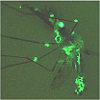New Study To Link Video Games With Childhood Development

Dr Scott Pedersen, from the UTAS Faculty of Education, is an adapted physical educator who has significant experience teaching physical activity to children with attention deficit hyperactivity disorder (ADHD) and other developmental disabilities. While teaching, he noticed that young children, children with general motor awkwardness, and children with developmental disabilities had trouble with movements that involve crossing the midline of the body.
?I believe that if children don?t acquire this particular skill by the age of 10, they may experience less success in certain physical activities, which may lead to an early withdrawal from participation in sports,? Dr Pedersen said. ?There might be a chance to teach children how to incorporate midline crossing movements into their activities of daily living and that this might facilitate their overall brain processing. It may lead to children being better suited to participate in developmentally appropriate physical activity and sport.?
To investigate this theory, Dr Pedersen started Project CrossMove, at the Skill Acquisition Laboratory on the UTAS Launceston campus. The project explores the effect of movement training programs on the speed at which children are able to initiate midline crossing movements. Some of the training programs used by Dr. Pedersen will incorporate popular gaming consoles such as the Nintendo Wii, that simulate real exercise movements, such as simulating hitting or throwing a ball.
Parents of children between the ages of seven and 13 interested in participating in this study will need to contact Dr. Pedersen to schedule a day to visit the UTAS Launceston campus. During the visit the child will play a fun arm and leg speed game, before and after either a traditional or simulated movement training program. This will take approximately one and a half hours.
For more information about Project CrossMove (or to sign up), click on this link.
Popular Science has been a leading source of science, technology and gadget news since 1872. With up-to-the minute latest space news, insightful commentary on the new innovations and concept cars ...if it's new or future technology you'll find it at popsci.com.au.
WW Media - Popular Science © 2010
Cameras - Home Entertainment - Mobile Phones





